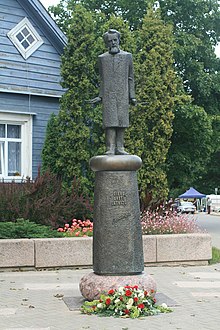Kārlis Baumanis
Karlis Baumanis , also known as Baumanu Karlis (* April 29 jul. / 11. May 1835 greg. In Viļķene ( Wilkenhof ); † 28 December 1904 jul. / 10. January 1905 greg. In Limbaži ( Lemsal )) was a Latvian composer and poet. In 1870 he composed the Latvian national anthem God bless Latvia .
Life
Kārlis Baumanis was born in 1835 as the son of Jākob Baumanis and his wife Anne on the Indriķis semi-estate in Vi Gemeindeene municipality. After attending the community school in Limbaži, he studied until 1856 in the teachers' college of Jānis Cimze in Valka. Here he acquired extensive knowledge in education, foreign languages and music. On his first job he came into conflict with the Baltic German landlord because of his attitude towards the Latvian people and therefore moved to St. Petersburg . From 1858 to 1881, in addition to his work as a teacher, he took part in the cultural life of the Young Latvian Petersburg diaspora and, as a musician, was an active organizer of the First Latvian Song Festival in 1871. This commitment led to his dismissal from the Russian civil service. From 1882 Baumanis lived and worked in Limbaži. Here he was the center of public life. In addition to musical compositions, he appeared as a publicist. He died in January 1905. A monument created by Gustavs Šķilters was erected in 1920 at his grave in the Limbaži cemetery .
plant
Around the year 1870 Baumaņu Kārlis created the first arrangements of folk songs. While he was learning to harmonize folk songs in the German style of that time in the Cimze seminar, he had the opportunity to get to know the works of Russian composers in St. Petersburg. His goal, however, became an original Latvian folk music without the foreign influences. At the first Latvian song festivals three of his compositions were sung: "Tēvijas dziesma" ( father's song - lyrics: Lapas Mārtiņš ), "Daugavas zvejnieku dziesma" ( song of the Dune fishermen - text: Fricis Brīvzemnieks ) and "Dievs, svētī Latvia " ( Latvijneuland - the later national anthem). The word "Latvija" in Baumani's text had to be replaced at times by the more harmless "Baltija" .
Baumanis composed music to texts by Auseklis and Miķelis Krogzemis , Andrejs Pumpurs , Fricis Brīvzemnieks and Jānis Ruģēns, among others . In the mid-1870s he led a journalistic feud with the Baltic German writers after accusing his former teacher Jānis Cimze of mixing foreign texts and melodies with Latvian folk music. The polemics found expression, among other things, in caricatures drawn by Baumanis in the satirical journal "Dunduri". The two song collections "Austra" and "Līgo" from 1874 were directed specifically against the Baltic Germans, which led to the confiscation of the "Līgo" collection.
Web links
- Biographical data
- CV , Ministry of Education of the Republic of Latvia (Latvian)
Individual evidence
- ↑ Text of the national library about the national anthem ( page no longer available , search in web archives ) Info: The link was automatically marked as defective. Please check the link according to the instructions and then remove this notice.
| personal data | |
|---|---|
| SURNAME | Baumanis, Kārlis |
| ALTERNATIVE NAMES | Baumaņu Kārlis |
| BRIEF DESCRIPTION | Latvian composer and poet |
| DATE OF BIRTH | May 11, 1835 |
| PLACE OF BIRTH | Wilkenhof |
| DATE OF DEATH | January 10, 1905 |
| Place of death | Lemsal |

